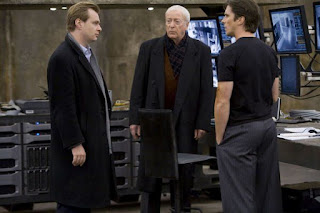Ranking Nolan's Batman Films
Without a doubt, Christopher Nolan's visionary take on Batman is the greatest series of superhero films of all time. With superhero films serving as our cultural mythology, this is huge. In the last decade alone we've seen a massive explosion in the number of superhero films on the market. Yet, Nolan's trio of Batman films have served as the gold standard, and are even starting to set the template for future reboots of series.
Ranking films is borderline ridiculous. Films are works of art, like paintings, representing the thoughts, ideas, and aesthetics of their creators. As such, people look at films in different ways, bringing different tastes to the films, and creating different reactions. Evaluation of films, like all art, is highly subjective, no matter what anyone wants to say.
That being said, in our current culture, we like to rate things nearly immediately. It is a human conceit to desire to put things in a logical pecking order. Even the disciples wanted to know who was the greatest, constantly asking Jesus to rank them and missing the point entirely.
With films, the point should be enjoying them as artistic works. But we all feel better about artistic works when we can put them in context with other things. Hence, the rankings have begun. I, too, have felt myself pulled into this debate about which of Nolan's Batman films is the greatest.
I think there are a few schools of thought when it comes to these types of films. First, this isn't just a trilogy — Nolan took pains to create a linked story. You can't fully appreciate "The Dark Knight Rises" without appreciating and understanding "Batman Begins" and "The Dark Knight." The films are linked through narrative. It is really like three chapters in one continuous story.
What makes it interesting are the comments from Nolan. He has indicated that he made each film narratively independent — meaning he didn't have three stories in mind when he began. He tackled each story as they came. That makes the achievement of interconnection even more remarkable. But he also cited "The Lord of the Rings" trilogy as an inspiration in completing "The Dark Knight Rises." That is three films, based on three books, that was always intended to be one continuous story. There are thematic similarities there. And, just as most people cleave to "Return of the King" as a favorite installment because there is a sense of completion in it, a number of people have praised "The Dark Knight Rises" as the best of this series for the same reasons. And it's hard to argue that there is a level of satisfaction at the end of the last film that sets it apart from the previous films.
"Batman Begins" felt like a perfect opening salvo. It ends by offering a window into the second film, whetting the audience appetite for what is to come next. Then, with "The Dark Knight," there is a sense of sadness and brokenness. Harvey Dent, in the film, says it's always darkest before the dawn, but the dawn is coming. At the end of that film, you get a sense of being in the midst of that darkness and you yearn to see the dawn.
At the end of "The Dark Knight Rises," you get conclusion to the story for all the major players. You see kind of that fitting, elusive happy ending for Bruce Wayne, Alfred, and the rest. There is a sense of completion that is satisfying, especially to our culture that predominantly relies on this type of storytelling.
But there is another way to look at this trilogy, and it relies on the model offered by "Star Wars." Of course I'm talking about the real "Star Wars" films, not the films made at the first part of the 21st Century. For years, there has been debate about which is the greatest film. It usually centers on two camps — "The Empire Strikes Back" camp and the "Return of the Jedi" camp. Your preference on films says a lot about what you look for in films, and your appreciation of the artistic process.
To me, "The Empire Strikes Back" is the superior film. Sure, it ends on a down note. The story isn't complete, and it ventures to a dark place of self-sacrifice on the part of Luke and Han Solo. But the character development, the ideology of the story, and the twists in the narrative are superior to "Return of the Jedi." "Jedi" features a more complete and satisfying resolution, but "Empire" is a better film.
That's how I feel about Nolan's Batman films. "Rises" offers a more complete and satisfying ending. Things are knotted up neatly. There is something calming and beautiful about that. I will probably have to see the film many more times (I've seen it twice already) to fully appreciate everything about it and the character nuances contained within. It is a beautiful film, and is the best film I've seen this year.
But it's not "The Dark Knight." To me, that was an incredible film that transcended its genre in an incredible way. The performances were great and the ideological and sociological issues raised in the film were compelling. It was nothing short of a masterpiece and, in my opinion, the best film of the first decade of the 21st Century. "The Dark Knight Rises" is incredible, but it's not quite at that level for me. I also appreciate the raw, vulnerable place "The Dark Knight" ends in. There is beauty in that. It's not complete. It's not satisfying. But it's beautiful, bold, and artistically daring.
Again, ranking films is a nearly pointless endeavor that is based purely on subjective terms. But we all do it anyway, so you might as well think through your argument. Though things change over time, I think that when choosing Nolan's best Batman film the buck stops with "The Dark Knight."




Comments
Post a Comment